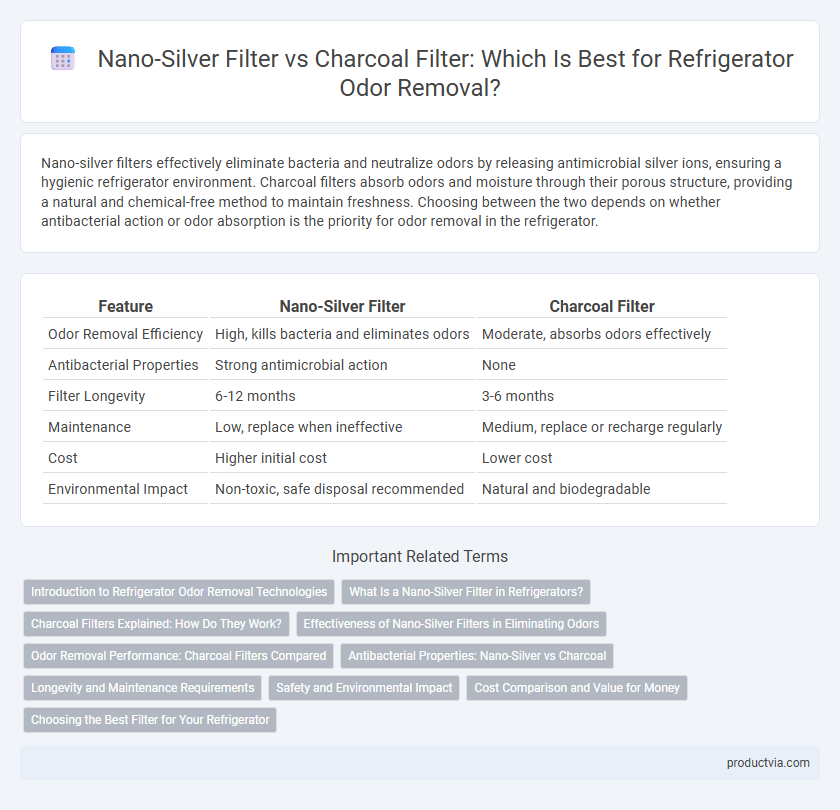Nano-silver filters effectively eliminate bacteria and neutralize odors by releasing antimicrobial silver ions, ensuring a hygienic refrigerator environment. Charcoal filters absorb odors and moisture through their porous structure, providing a natural and chemical-free method to maintain freshness. Choosing between the two depends on whether antibacterial action or odor absorption is the priority for odor removal in the refrigerator.
Table of Comparison
| Feature | Nano-Silver Filter | Charcoal Filter |
|---|---|---|
| Odor Removal Efficiency | High, kills bacteria and eliminates odors | Moderate, absorbs odors effectively |
| Antibacterial Properties | Strong antimicrobial action | None |
| Filter Longevity | 6-12 months | 3-6 months |
| Maintenance | Low, replace when ineffective | Medium, replace or recharge regularly |
| Cost | Higher initial cost | Lower cost |
| Environmental Impact | Non-toxic, safe disposal recommended | Natural and biodegradable |
Introduction to Refrigerator Odor Removal Technologies
Nano-silver filters utilize antimicrobial properties of silver nanoparticles to eliminate bacteria and odors in refrigerators, providing long-lasting deodorization. Charcoal filters absorb odors and moisture through activated carbon, effectively neutralizing a wide range of smells but requiring regular replacement to maintain efficiency. Both technologies enhance refrigerator air quality, with nano-silver filters offering sustained antimicrobial benefits, while charcoal filters excel in broad-spectrum odor adsorption.
What Is a Nano-Silver Filter in Refrigerators?
A nano-silver filter in refrigerators utilizes nanoparticles of silver known for their strong antibacterial and antiviral properties to effectively eliminate odors and inhibit the growth of mold and bacteria inside the fridge. Unlike charcoal filters that adsorb odors through activated carbon, nano-silver filters neutralize harmful microorganisms and organic compounds at a molecular level, enhancing freshness and hygiene. This advanced technology ensures prolonged odor control and safer food storage by maintaining a cleaner internal environment.
Charcoal Filters Explained: How Do They Work?
Charcoal filters remove refrigerator odors by trapping and neutralizing volatile organic compounds and gases through adsorption on activated carbon surfaces. The porous structure of activated charcoal provides a large surface area that captures odor-causing molecules effectively. Compared to nano-silver filters, charcoal filters target a broader range of odor sources without relying on antimicrobial properties, making them ideal for eliminating food odors.
Effectiveness of Nano-Silver Filters in Eliminating Odors
Nano-silver filters in refrigerators offer superior odor elimination by utilizing antibacterial properties of silver nanoparticles to effectively neutralize odor-causing bacteria and volatile organic compounds. Unlike charcoal filters, which primarily absorb odors, nano-silver filters actively disrupt microbial growth, providing longer-lasting freshness and improved hygiene. Studies show nano-silver technology reduces refrigerator odors more efficiently, maintaining a cleaner environment and preventing the proliferation of mold and bacteria that cause unpleasant smells.
Odor Removal Performance: Charcoal Filters Compared
Charcoal filters excel in odor removal for refrigerators due to their porous structure, which effectively adsorbs a wide range of volatile organic compounds (VOCs) and household odors. Unlike nano-silver filters, which primarily target bacteria and microbes, charcoal filters provide superior performance in trapping smells from spoiled food and lingering aromas. Their ability to neutralize odors without altering the air's humidity or temperature makes them ideal for maintaining a fresh refrigerator environment.
Antibacterial Properties: Nano-Silver vs Charcoal
Nano-silver filters provide superior antibacterial properties by releasing silver ions that actively destroy bacteria and inhibit microbial growth, ensuring a cleaner and safer refrigerator environment. Charcoal filters primarily absorb odors and impurities through porous carbon but lack inherent antibacterial activity, making them less effective at controlling bacterial contamination. The antimicrobial efficacy of nano-silver technology makes it a preferred choice for maintaining hygiene and odor control in refrigerators.
Longevity and Maintenance Requirements
Nano-silver filters offer prolonged effectiveness in refrigerator odor removal, typically lasting up to 12 months due to their antimicrobial properties that resist microbial buildup. Charcoal filters require more frequent replacement, usually every 3 to 6 months, as activated charcoal absorbs odors until saturated. Maintenance for nano-silver filters is minimal since their antimicrobial action reduces the need for cleaning, whereas charcoal filters demand regular replacement to maintain optimal odor control performance.
Safety and Environmental Impact
Nano-silver filters offer effective antibacterial properties for refrigerator odor removal but raise concerns about potential silver nanoparticle release, which may impact aquatic ecosystems and human health. Charcoal filters utilize activated carbon to adsorb odors safely without chemical leaching, making them environmentally friendly and non-toxic. Choosing charcoal filters prioritizes sustainability and consumer safety by minimizing ecological risks compared to nano-silver alternatives.
Cost Comparison and Value for Money
Nano-silver filters typically have a higher upfront cost compared to charcoal filters but offer extended durability and enhanced antibacterial properties that improve long-term odor removal efficiency in refrigerators. Charcoal filters are more affordable initially but require frequent replacements, which may increase overall maintenance expenses over time. Evaluating the cost per use, nano-silver filters provide better value for money through their longevity and superior odor control capabilities.
Choosing the Best Filter for Your Refrigerator
Nano-silver filters eliminate bacteria and mold spores through powerful antimicrobial properties, effectively reducing unpleasant odors and improving air quality inside the refrigerator. Charcoal filters absorb odor-causing molecules and volatile organic compounds, providing long-lasting freshness by neutralizing strong smells like fish or spoiled food. Choosing the best filter depends on whether you prioritize antibacterial protection with nano-silver or superior odor absorption with activated charcoal for maintaining a clean, odor-free refrigerator environment.
Nano-silver filter vs charcoal filter for refrigerator odor removal Infographic

 productvia.com
productvia.com